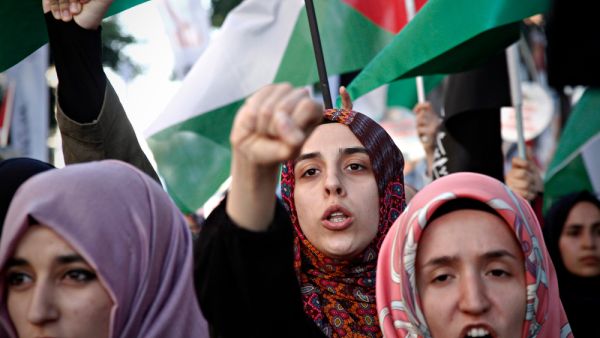A Hamas-run Islamic court in the Gaza Strip has ruled that women require the permission of a male guardian to travel, further restricting movement in and out of the territory that has been blockaded by Israel and Egypt since the group seized power.
The rollback in women’s rights could spark a backlash in Gaza at a time when the Palestinians plan to hold elections later this year. It could also solidify Hamas’s support among its conservative base at a time when it faces criticism over living conditions in the territory it has ruled since 2007.
The decision by the Sharia Judicial Council, issued Sunday, says an unmarried woman may not travel without the permission of her “guardian,” which would usually refer to her father or another older male relative. Permission would need to be registered at the court, but the man would not be required to accompany the woman on the trip.
The language of the ruling strongly implied that a married woman would not be able to travel without her husband’s approval.
Bad enough that Israel and Egypt are blockading Gaza. Now a Hamas-run Islamic court in Gaza has made the retrograde ruling that women also require the permission of a male guardian to travel. https://t.co/oa4acRNzNj pic.twitter.com/Hw4Ea4eEPo
— Kenneth Roth (@KenRoth) February 16, 2021
The edict also said that a man could be prevented from travelling by his father or grandfather if it would cause “grave harm.” But the man would not need to seek prior permission, and the relative would have to file a lawsuit to prevent him from travelling.
— Justifying restrictions –
The ruling resembles the so-called guardianship laws that existed in Saudi Arabia, where women were treated as minors requiring the permission of a husband, father or even a son to apply for a passport and travel abroad. The kingdom loosened those restrictions in 2019.
Hassan al-Jojo, head of the Supreme Judicial Council, said that the ruling was “balanced” and consistent with Islamic and civil laws. He dismissed what he called “artificial and unjustified noise” on social media about the edict.
He justified the measure by citing past instances in which girls had travelled without the knowledge of their parents and men had left their wives and children without a breadwinner.
Israel and Egypt have largely sealed Gaza’s borders since Hamas seized power from rival Palestinian forces in 2007. Israel says the restrictions are needed to isolate the Islamist group, which has fought three wars with Israel, and prevent it from acquiring arms.
Absolutely horrible development.
— Sunjeev Bery (@SunjeevBery) February 16, 2021
This ruling alongside Israel's blockade will make life even worse for Palestinian women in #Gaza.
"A Hamas-run Islamic court in the Gaza Strip has ruled that women require the permission of a male guardian to travel.."
https://t.co/ZlPb3O1VUC
The territory is home to some 2 million Palestinians. All Gazans must go through a lengthy permit process to travel abroad and largely rely on the Rafah crossing with Egypt, which only opens sporadically. The restrictions make it difficult for people to seek medical care or higher education outside the narrow coastal strip.
— Going backwards –
The ruling sparked criticism on social media, where many accused Hamas of rolling back women’s rights even as Saudi Arabia has eased its restrictions, including by allowing women to drive. The Palestinian People’s Party, a small left-wing group, called on Hamas to reverse the decision.
The secular Democratic Front for the Liberation of Palestine condemned the edict as “a violation of basic Palestinian law and the Universal Declaration of Human Rights.”
The Geneva-based Euro-Mediterranean Human Rights Monitor said the measure was “a flagrant violation of the right to movement” and demanded its immediate withdrawal.
Zainab al-Ghunaimi, an activist who runs a Gaza-based group focused on women’s rights, said the ruling contravenes the Palestinian Basic Law, which grants equal rights to adults, and means that authorities are “going backwards in protecting human rights.”
She noted that the same legal body allows a woman to marry at age 16 and get travel documents on her own.
Hamas has not imposed the kind of harsh interpretation of Islamic law championed by other armed groups, such as ISIS and the Taliban in Afghanistan. But it has taken some limited steps to enforce the territory’s conservative mores, including the imposition of an Islamic dress code on female lawyers and high school students.
The deterioration of public freedoms is one of the most major issues that are not tackled in the Palestinian territories. In many of its reports, the Palestinian Centre for Human Rights has linked this to the division between Fatah and Hamas.
Over the past two years, the Palestinian Independent Commission for Human Rights has repeatedly reported that Palestinian women are paying the highest price for the ongoing political division between the Palestinian Authority, Hamas and the political entities loyal to each of them.
According to the United Nations, Gaza women are specifically subjected to double restrictions due to their residence in the besieged Gaza Strip for 16 years, not only restricting their movement, but also making them face harsh financial conditions. Over the last decade, the unemployment rate has increased among educated women in Gaza. Palestinians also suffer from strict restrictions on the movement of people and goods as well as Israeli military operations.
This article has been adapted from its original source.








